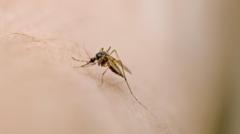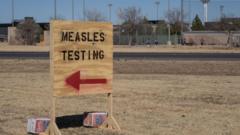Genetic fragments of the West Nile virus have been detected in mosquitoes in the UK for the first time, leading to promises of more guidance for healthcare professionals, while officials reassure the public of a low risk.
First Detection of West Nile Virus in UK Mosquitoes Raises Alerts

First Detection of West Nile Virus in UK Mosquitoes Raises Alerts
UK Health Security Agency identifies genetic material in mosquitoes, prompting health advisory.
In a groundbreaking revelation, the UK Health Security Agency (UKHSA) confirmed the detection of West Nile virus fragments in two samples of Aedes vexans mosquitoes collected in Britain in 2023. This marks a notable first for the region, as the disease, which primarily circulates in birds and is transmitted through bird-biting mosquitoes, has not previously been reported in the UK.
Although the genetic material was found, a UKHSA spokesman emphasized that "the risk to the general public is very low," a statement designed to quell any immediate concerns among the populace. Nevertheless, guidelines will be provided to healthcare professionals, ensuring they are prepared should any cases arise.
West Nile virus is known for its asymptomatic nature, with many infected individuals showing no symptoms at all. In rare situations, however, it can lead to severe neurological disease. As mosquitoes can transport the virus and the potential exists for infections in humans, the detection has prompted a precautionary response from health authorities.
Experts suggest that local conditions, such as climate and mosquito populations, may influence the virus's spread. With rising temperatures associated with climate change, the potential for West Nile virus to thrive in new regions is an area of concern for public health officials.
The development draws attention to the increasing need for vigilance in the face of vector-borne diseases, particularly as globalization facilitates the movement of species and pathogens. With the UK previously considered a relatively safe zone for such infections, the news has raised questions about the country's readiness to manage emerging threats.
As the situation unfolds, public health experts will be monitoring mosquito populations closely and investigating further to understand the implications of this detection fully and to devise strategies that protect both local and visiting populations from vector-borne illnesses.
Although the genetic material was found, a UKHSA spokesman emphasized that "the risk to the general public is very low," a statement designed to quell any immediate concerns among the populace. Nevertheless, guidelines will be provided to healthcare professionals, ensuring they are prepared should any cases arise.
West Nile virus is known for its asymptomatic nature, with many infected individuals showing no symptoms at all. In rare situations, however, it can lead to severe neurological disease. As mosquitoes can transport the virus and the potential exists for infections in humans, the detection has prompted a precautionary response from health authorities.
Experts suggest that local conditions, such as climate and mosquito populations, may influence the virus's spread. With rising temperatures associated with climate change, the potential for West Nile virus to thrive in new regions is an area of concern for public health officials.
The development draws attention to the increasing need for vigilance in the face of vector-borne diseases, particularly as globalization facilitates the movement of species and pathogens. With the UK previously considered a relatively safe zone for such infections, the news has raised questions about the country's readiness to manage emerging threats.
As the situation unfolds, public health experts will be monitoring mosquito populations closely and investigating further to understand the implications of this detection fully and to devise strategies that protect both local and visiting populations from vector-borne illnesses.




















